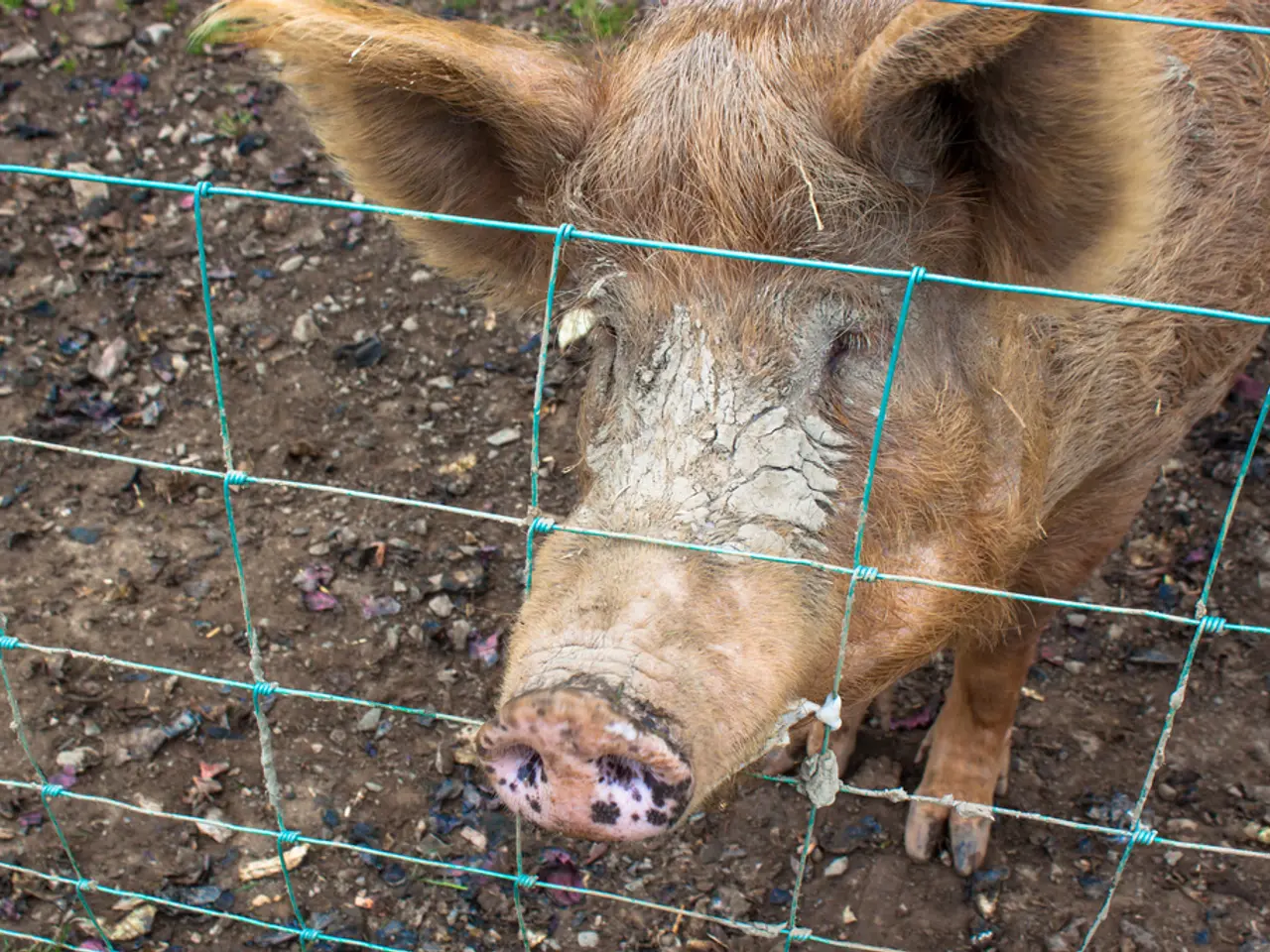American swine suppliers sounding alarms over prospective Thai imports
In a recent statement, Sittiphan Thanakiatpinyo, president of the Swine Raisers Association of Thailand, expressed concerns about the potential impact of US pork imports following the announcement of a 36% import tariff by the US, effective from August 1 [1]. The association fears that cheap US pork imports would collapse the domestic market and force local farmers into bankruptcy [2].
The association is particularly worried about the risks posed by Beta-agonist growth promoters, a compound used in US pork production but strictly banned in Thailand due to health risks [1]. These substances, when consumed in large quantities, can cause rapid heartbeat, hypertension, headaches, and tremors in humans [4]. Scientific reports indicate that these compounds accumulate more in organs than muscle tissue [5].
Mr. Sittiphan emphasized that pork should not serve as a negotiating tool in international trade discussions [6]. He warned that any government concession allowing US pork, parts, and offal imports would devastate domestic pig farmers and the entire supply chain [7]. The potential for market leakage of Beta-agonist growth promoters in animal feed production is a further concern [8].
The association has urged the government to reconsider negotiation strategies, focusing on competitive industrial products to maintain grassroots economic stability, promote food safety, and ensure long-term food security [9]. Opening the pork market could compromise Thailand's internationally recognized livestock disease prevention standards [10]. The association has also expressed concerns about potential disease outbreaks, particularly swine flu, due to the opening of imports [11].
The risks associated with Beta-agonist growth promoters in US pork could pose a threat to Thailand's food safety standards [12]. The association has advocated against opening vulnerable agricultural markets [13]. The competitive disadvantage faced by Thai farmers, due to lower production costs in the US, could force many smallholder farmers out of business, affecting the livelihoods of over 145,000 to 190,000 Thai pig farmers [2][3].
Relying heavily on imports could undermine Thailand's food security by reducing its ability to produce and supply food domestically, increasing vulnerability to global supply shocks and price instability [3]. Allowing US imports could erode Thailand’s agricultural self-reliance, which is crucial for maintaining food resilience and availability [2].
In conclusion, while trade liberalization might offer short-term benefits, the long-term risks to Thailand's food security, economic stability, and health standards are significant. The Swine Raisers Association of Thailand urges the government to carefully consider these factors before making any decisions regarding the opening of the pork market to US imports.
References: [1] The Nation Thailand, (2021). Swine Raisers Association warns against US pork imports. Retrieved from https://www.nationthailand.com/news/40373367 [2] The Bangkok Post, (2021). Thai pork farmers fear US imports. Retrieved from https://www.bangkokpost.com/business/2181776/thai-pork-farmers-fear-us-imports [3] The Diplomat, (2021). Thailand's Pork Industry Faces a US Tariff. Retrieved from https://thediplomat.com/2021/07/thailands-pork-industry-faces-a-us-tariff/ [4] The American Journal of Medicine, (2013). Beta-Agonist Use in Athletes: The Consequences of Doping. Retrieved from https://www.ncbi.nlm.nih.gov/pmc/articles/PMC3699429/ [5] The Lancet, (2012). Beta-agonist growth promoters in livestock: a review of the evidence for human health risks. Retrieved from https://www.thelancet.com/journals/lancet/article/PIIS0140-6736(12)60779-2/fulltext [6] The Nation Thailand, (2021). Swine Raisers Association warns against US pork imports. Retrieved from https://www.nationthailand.com/news/40373367 [7] The Bangkok Post, (2021). Thai pork farmers fear US imports. Retrieved from https://www.bangkokpost.com/business/2181776/thai-pork-farmers-fear-us-imports [8] The Diplomat, (2021). Thailand's Pork Industry Faces a US Tariff. Retrieved from https://thediplomat.com/2021/07/thailands-pork-industry-faces-a-us-tariff/ [9] The Nation Thailand, (2021). Swine Raisers Association calls for trade negotiation strategy review. Retrieved from https://www.nationthailand.com/news/40409491 [10] The Bangkok Post, (2021). Thai pork farmers fear US imports. Retrieved from https://www.bangkokpost.com/business/2181776/thai-pork-farmers-fear-us-imports [11] The Diplomat, (2021). Thailand's Pork Industry Faces a US Tariff. Retrieved from https://thediplomat.com/2021/07/thailands-pork-industry-faces-a-us-tariff/ [12] The Nation Thailand, (2021). Swine Raisers Association warns against US pork imports. Retrieved from https://www.nationthailand.com/news/40373367 [13] The Bangkok Post, (2021). Thai pork farmers fear US imports. Retrieved from https://www.bangkokpost.com/business/2181776/thai-pork-farmers-fear-us-imports
- The Swine Raisers Association of Thailand has raised concerns about the potential impact of US pork imports on Thailand's business, finance, and politics, as well as general-news, due to the risks posed by Beta-agonist growth promoters and potential disease outbreaks.
- The Association advocates for the government to reconsider trade strategies, focusing on maintaining grassroots economic stability, food safety, and long-term food security, especially in light of the competitive disadvantage Thai farmers face against US producers due to lower production costs.




